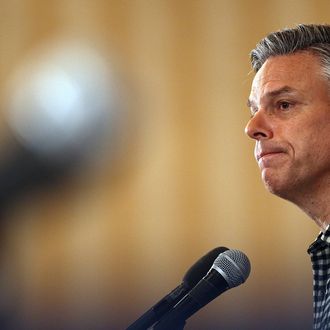
With just a few days (and two weekend debates) until the New Hampshire primary, things are unfolding in the Granite State pretty much according to plan — at least for Mitt Romney, who continues to lead the race by approximately a million points over Ron Paul and a recently ascendent Rick Santorum. Things aren’t so peachy, however, for Jon Huntsman, who, despite campaigning in New Hampshire almost exclusively for the past few months, finds himself battling for fourth place with Newt Gingrich. One would assume that coming in fifth place, fourth place, or even third place would be a disappointing finish for Huntsman, but the former Utah governor has been insisting all week that his goal is simply beating “market expectations.” On Fox News this morning, he elaborated on what that means:
HUNTSMAN: We have to meet market expectations. You and the rest of the pundit class will set expectations for us going into the vote. We have to be able to clear that hurdle. In other words, we have to be able to wake up on the 11th and say, “We did better than what the market expectations were for us.”
BILL HEMMER: Would that be third place, would that be second place? What would that be?
HUNTSMAN: You can’t quantify it, you can’t quantify it, because we came from very last place.
HEMMER: What are you looking for?
HUNTSMAN: I’m looking to beat market expectations.
It’s a pretty common and widely accepted bar to set for your campaign. If you beat expectations, you did well. Santorum didn’t technically win in Iowa (or did he?), but he was never supposed to come close, so he left Iowa with momentum. The problem for Huntsman is that “market expectations” for his performance in New Hampshire were set a long time ago, and he’s underperforming them by a long shot. When Huntsman entered the race last June, practically every pundit in America agreed that he needed to win there, or at the very least, give Romney a run for his money. Even more important, as far as expectations-setting goes, is that Huntsman himself has explicitly predicted his outright victory in New Hampshire for months now, and as recently as three weeks ago.
- “This campaign is moving in the right directions that will allow us to win New Hampshire.” — Jon Huntsman, August 4.
- “We’re going to win New Hampshire.” — Jon Huntsman, August 5.
- “I want to put you on notice. We’re going to win this state. We’re going to win this primary.” — Jon Huntsman, September 1.
- “Oh I think we can win New Hampshire.” — Jon Huntsman, September 17.
- “This move will ensure that we have the resources necessary to win (there).” — Huntsman campaign manager Matt David, September 29.
- “I’m just going to tell you right now, we’re going to win this primary. I like our chances right here.” — Jon Huntsman, December 19.
Even though nothing has happened that would make New Hampshire less of a must-win state than it always has been, Huntsman would like everyone to agree on new, updated expectations that take into account his failure to catch on there. It’s worth a shot on his part, but that’s just not how it works. Look at the world of sports: Because head coach Mike D’Antoni predicted that the Knicks would compete for the championship this year, nobody is going to applaud them for merely making the playoffs, despite the fact that they’ve started off the season with an ugly record. Sorry, Jon Huntsman, but you are now … the Knicks.





























